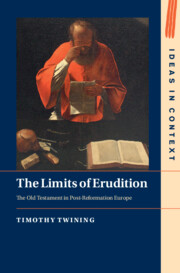Book contents
- The Limits of Erudition
- Ideas in Context
- The Limits of Erudition
- Copyright page
- Contents
- Acknowledgements
- Notes on the Text
- Abbreviations
- Introduction
- Chapter 1 Biblical Criticism in Catholic Europe, c. 1590–1630
- Chapter 2 After Tiberias
- Chapter 3 Biblical Criticism and Mutual Censorship in the Confessional Republic of Letters
- Chapter 4 From Manuscript to Print
- Chapter 5 A Protestant Polyglot Bible
- Chapter 6 The Ends of Biblical Scholarship, c. 1657–1670
- Chapter 7 Richard Simon and the Limits of Erudition
- Conclusion
- Bibliography
- Index
Chapter 6 - The Ends of Biblical Scholarship, c. 1657–1670
Published online by Cambridge University Press: 05 December 2024
- The Limits of Erudition
- Ideas in Context
- The Limits of Erudition
- Copyright page
- Contents
- Acknowledgements
- Notes on the Text
- Abbreviations
- Introduction
- Chapter 1 Biblical Criticism in Catholic Europe, c. 1590–1630
- Chapter 2 After Tiberias
- Chapter 3 Biblical Criticism and Mutual Censorship in the Confessional Republic of Letters
- Chapter 4 From Manuscript to Print
- Chapter 5 A Protestant Polyglot Bible
- Chapter 6 The Ends of Biblical Scholarship, c. 1657–1670
- Chapter 7 Richard Simon and the Limits of Erudition
- Conclusion
- Bibliography
- Index
Summary
Chapter 6 shows how the later 1650s and 1660s defy ready categorisation, with the practices and tools of biblical scholarship being drawn on in a range of different ways in a range of different contexts. Its three parts proceed concurrently, rather than chronologically, and successively analyse: the way in which debate concerning the Old Testament became increasingly polemical, framed in terms of a choice between the Masoretic Hebrew text or the Septuagint; how biblical scholarship differed according to different local settings (in this case Italy (and especially Rome) and the Dutch Republic); and how Benedict de Spinoza, comparatively disconnected from the confessionalised world of Old Testament scholarship, targeted a precise set of the views concerning the Bible held by others in his local Reformed and Jewish communities.
Keywords
- Type
- Chapter
- Information
- The Limits of EruditionThe Old Testament in Post-Reformation Europe, pp. 210 - 244Publisher: Cambridge University PressPrint publication year: 2024

